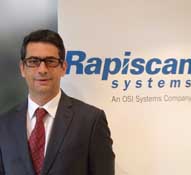Fred Brouiller, Vice President Sales EMEA at Rapiscan, pictured, talks about how the events sector is tackling heightened security issues head-on, how the publics increased awareness of security threat is changing the industry and what can be expected in Brazil later this year.
Securing international events with the world’s eyes upon you and the responsibility of keeping thousands of people safe is no mean feat. Factor in the massive global change in threat over the last decade and it’s no wonder security is giving the events industry a headache. But, given due consideration, events such as the London 2012 Games can leave nothing but lasting memories of great sporting moments, not breaches in security.
Event security before and after global threat
Looking back, event security probably meant a bit of fencing and perhaps some patrolling security staff. Many visitors will remember entering events with little or no security checks. This was before the advent of global terrorism and threat. 9-11 changed the world and proved to be watershed moment, not only for air travel, but for the events industry as well. Event’s organisers recognised that threat was now on a global scale. With sporting events catching the imagination of so many worldwide, the pure globalisation of sport renders it the most vulnerable type of event. That day in 2001 exponentially forced the industry into including security as a major planning aspect of any event.
Raising the bar at London 2012
The London Olympics raised the bar in terms of security and proved an impressive model for security standards. As the Official Security Equipment and Systems Provider of the London Olympics, we saw first-hand the challenges and opportunities that the 2012 Olympics have presented to the event industry. Lasting memories of the Games will include the successes of the athletes, but also the security which ensured the safety of visitors, staff and athletes alike.
We supplied one thousand x-ray machines and the same number of archway and hand-held metal detectors to the Games organisers. The ‘hands on’ approach of the Government when buying security at London 2012 proves how supply has changed as global threat increases, making them a key stakeholder from the beginning. Additionally with part of the equipment being funded by the public purse it meant that the government took an active role in the decision process. was unable to sit back and take an inactive role as they will be the ones held accountable.
It’s not where the event is, but who is attending
Today we are not just concerned with local threats, but threats that come from all four corners of the globe. As a result the security industry has learned that it is not necessarily where you hold an event which dictates the level of security needed, but a thorough risk assessment that drives how you protect those that have been invited. London is a relatively safe city, yet the screening of people and baggage put in place leading up to the Olympic Games in 2012 was on a par with any location deemed less safe around the world.
As we approach the first anniversary of the Boston Marathon Bombings, we are reminded that all events are under potential threat and event’s organisers from large to small events, from ‘safe’ to ‘troubled’ locations; need to consider security as a high priority without exception.
Security from obtrusive to expected
One of the biggest changes within the industry has been the changed attitudes of visitors to events in terms of security screening. Once perceived as obtrusive, security scanning devices and are now so widely adopted and expected that a venue may not be deemed ‘secure’ without them. This shift in public perception from obtrusive to comforting has enabled security technology to play a larger role, not only for physical security checks but to enable visitors the peace of mind of security. During the Brazil 2013 Confederations Cup, we successfully screened 500,000 people including all attendees, players, staff and media. In addition to people, we screened all freight delivered to the stadiums on non-games days. Yet there was no adverse reaction to these security measures. The key to acceptance is using great technology, with high throughput ensuring that bottlenecks do not appear.
What can we expect from Glasgow 2014 and the Brazil World Cup?
With all eyes on Brazil in June, the Glasgow 2014 Commonwealth Games in July and looking forward to the Rio 2016 Olympics, expect to see security take centre stage. The plethora of global news stories about Brazil’s security measures leading up to the World Cup in June emphasises just how much the world is watching. Physical security, body and bag scanning, is going to be incredibly important, yes as a deterrent against threat, but also to act as a physical reminder that the organisers are taking threats seriously. The combination of great security technology with high throughput and high visibility of security measures will put the event industry in great stead to ensure we continue to create great sporting moments.









